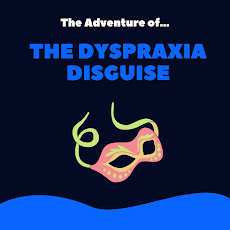The Adventure of the Dyspraxia Disguise
I've written fairly extensively about having dyspraxia here and the way it affects me in my adult life. I don't really think of dyspraxia that much on a day to day basis. I've come up with solutions to most challenges I face on a regular basis and have ways of going about things that work for me.
My colleagues found it amusing as I explained that I use the same space at every place I need to park at. I recognise that this is perhaps not normal practice and share some of the amusement but it works for me- I feel far more confident at parking and leaving the space if it's one I've practiced at and beside, this method means I always know where my car is. The flaw is of course that it relies on the space being empty and a wave of anxiety does wash over me if one some stranger has dared to park in the space I lay personal claim to.
Whilst I do have my own tactics for getting through everyday life every now and then a new challenge comes along. Usually these arrive completely out of the blue and I get a rush of panic as I realise that my brain just isn't built to the task in hand. Take when we started teaching our students at work how to tie their shoelaces. I wouldn't have imagined this would create much difficulty- I can after all tie shoelaces, even if it I didn't master the skill until the verge of becoming an adult. But attempting to support students to learn the process was something I found really tricky- doing it from different angles and manipulating small hands to tie laces seemed an impossible task.
Another recent occasion when I felt the sudden panic was when I found myself teaching a maths unit on positions and directions and began to teach our class their left and rights. Again, this was not something I imagined would be especially difficult as I don't have a great deal of trouble distinguishing between my left and right. I felt pretty confident actually as I'd developed a system of coloured stickers and hand cut-outs to teach the concept which I thought was quite effective. Then the lesson arrived and my task was to demonstrate the task at hand and then stick left and right stickers on each students hands. The trouble I soon discovered was that I was faced the opposite way to the students being at the front of the class and I just couldn't get my head around the mirror reflections needed to show things from the students point of view. I bumbled my way through the lesson but it certainly wasn't as effective as it could have been. For the next lesson I videoed myself doing most of the input which was far better and I could just start again if I made a mistake!
Dyspraxia moments come at the most unexpected of times. A recent source of joy for me has been attending board game evenings at a local café. We play a whole range of games and most people are better at some than others, myself included. We've played Jenga a few times and I've been surprised that I'm actually not bad at it- on one occasion I extracted a brick that was so rigidly stuck that there was gasps of surprise when I inexplicably removed it safely.
On one session we began to play a game called Dobble. In this game you are given a series of cards which have a whole bunch of small pictures on them. When someone lays down a card you are supposed to find a picture on that card which matches a picture on your card and throw it down quickly whilst saying what the picture is. The aim is to lay down all your cards as quickly as possible. It soon transpired that this game was not for me. It's easy to forget that dyspraxia is a processing disorder but that thought was well in my mind when I was playing this game. I just couldn't process the pictures quickly enough and I found myself only managed to place one or two cards every round whilst others would be laying down cards at a rapid rate.
I spent much of my childhood having an uncanny feeling that I was somehow different to everyone around me until in my early 20s I realised I had dyspraxia and so much of my life made sense. Over time I've come to accept and understand the ways in which I am different and have developed strategies that make me feel like my brain works normally most of the time. But there are moments like the ones I've talked about here when I feel like I've been caught out, like my normal-person disguise has been uncovered by those around me. Even in casual conversations I sometimes find myself working hard to keep up the disguise. Sometimes a topic like learning to ride a bike or learning to drive might come up and I find myself backing out of the conversation or limiting the information I'm sharing so the huge struggle I faced isn't revealed.
I'm not even sure why I do this anymore. In my experience most human beings are kind and understanding people and as an adult you have more of an opportunity to surround yourself with such people. In most circumstances no-one is going to judge me for my inability to do certain things. I think that perhaps that eighteen-ish years of struggling with things and being mocked by my peers is what created the disguise and whilst I am more confident in who I am than I've ever been before, I'll likely always wear the disguise to some extent.


Comments
Post a Comment